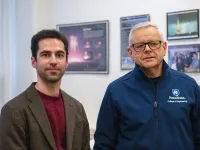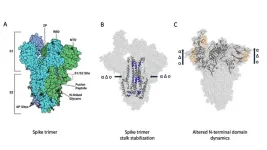(Press-News.org) On Friday March 31st, 2023 at a ceremony in Paris, the Institut Pasteur President, Professor Stewart Cole, and the University of São Paulo (USP) Rector, Carlos Gilberto Carlotti Junior, signed articles of association for the Institut Pasteur in São Paulo, a private non-profit organization under Brazilian law. The mission of the institute, an associate member of the Pasteur Network, is to conduct research in the field of biology that contributes to the development of human health, and to promote outreach, education, innovation and knowledge transfer activities and public health measures.
The Institut Pasteur in São Paulo will be based on the Cidade Universitária campus, in a vast 2,000m² space with 17 laboratories, a bioinformatics facility and several multi-user laboratories. When it becomes fully operational, the new institute will house more than 80 scientists from Brazil and other countries who will conduct international-level research on communicable, non-communicable, emerging, re-emerging, neglected and progressive diseases, including those involving neurological dysfunction and degeneration.
"The signing of the articles of association of the Institut Pasteur in São Paulo marks a major step forward that will strengthen the Institut Pasteur's cooperation with Brazilian institutions. I would particularly like to mention the importance and relevance of the work achieved by the teams in the Scientific Platform Pasteur-USP, especially during the COVID-19 pandemic, and the platform's integral position within the research ecosystem in the State of São Paulo. The Institut Pasteur in São Paulo aims to deliver scientific excellence for the benefit of local populations," declared Professor Stewart Cole.
"A key priority for our rectorate management team is to strengthen the University of São Paulo's links with society. The establishment of the Institut Pasteur in São Paulo, in partnership with the Institut Pasteur, represents a major step forward in this direction and complements other ongoing initiatives, including several partnerships with other French universities and research centers. It is an important milestone in the continuing internationalization of our university. France has played a strategic role throughout our history, ever since the USP was founded nearly 90 years ago," added Professor Carlos Gilberto Carlotti.
The articles of association were signed at a ceremony at the Institut Pasteur in Paris, attended by French and Brazilian authorities including Tarcísio Gomes de Freitas, São Paulo State Governor, Marco Antonio Zago, São Paulo Research Foundation (FAPESP) President, Michèle Ramis, Director of the American & Caribbean Department at the French Ministry of Europe and Foreign Affairs, and Yves Teyssier d'Orfeuil, Consul General of France in São Paulo.
The establishment of the Institut Pasteur in São Paulo will help strengthen cooperation between France and Brazil by paving the way for the countries to work together on priority public health measures.
"This signing ceremony is a historic occasion for the scientific facility we have opened. It strengthens the collaboration between the State of São Paulo, the University of São Paulo and the Institut Pasteur. Our structure's new status as the "Institut Pasteur in São Paulo" and associate member of the Pasteur Network would not have been possible without the unwavering commitment of our institutions and the support of the French and Brazilian authorities, which is a great example of international scientific collaboration," indicated the SPPU coordinator, Paola Minoprio.
The Institut Pasteur in São Paulo has emerged from an agreement between the Institut Pasteur and USP, signed in 2017 and renewed in 2022. Under the agreement, the two partners pledged to develop a scientific platform, an intermediate stage before the formal establishment of an institute. The Institut Pasteur in São Paulo will take over the rights and obligations of the Scientific Platform Pasteur-USP, and will remain an associate member of the Pasteur Network. The Pasteur Network is a vast human and scientific community with more than 30 members in around 20 countries working together to help improve global health.
The Scientific Platform Pasteur-USP (SPPU) was inaugurated in June 2019 under the joint coordination of Dr. Paola Minoprio (Institut Pasteur) and Dr. Luís Carlos Souza Ferreira (USP). It initially had five research teams, but when the COVID-19 pandemic struck, a sixth team was rapidly put together to study the virus and the disease. The Scientific Platform Pasteur-USP also joined the USP network for COVID-19 diagnosis (RUDIC), a working group for large-scale diagnostics composed of several laboratories in the State of São Paulo.
In 2022, the Scientific Platform Pasteur-USP had seven principal investigators and 29 PhD students and postdoctoral fellows, and had established partnerships with more than 20 institutions. Since it was founded, SPPU has published more than 60 scientific articles, including several during the COVID-19 pandemic.
For more information
Launch of the Pasteur-USP scientific platform in 2019: https://www.pasteur.fr/en/home/institut-pasteur/institut-pasteur-throughout-world/news/institut-pasteur-launches-scientific-platform-university-sao-paulo-research-and-innovation-center
Presentation of Pasteur-USP platform on Pasteur Network's website: https://pasteur-network.org/en/members/american-region/sppu/
Website of the Pasteur-USP scientific plateform (in portuguese) : https://sppu.com.br/
END
The Institut Pasteur and the University of São Paulo sign articles of association to establish the Institut Pasteur in São Paulo
2023-03-31
ELSE PRESS RELEASES FROM THIS DATE:
Mathematical model provides bolt of understanding for lightning-produced X-rays
2023-03-31
UNIVERSITY PARK, Pa. — In the early 2000s, scientists observed lightning discharge producing X-rays comprising high energy photons — the same type used for medical imaging. Researchers could recreate this phenomenon in the lab, but they could not fully explain how and why lightning produced X-rays. Now, two decades later, a Penn State-led team has discovered a new physical mechanism explaining naturally occurring X-rays associated with lightning activity in the Earth’s atmosphere.
They published their ...
nTIDE March 2023 Deeper Dive: Intersection of race and disability perpetuate inequalities in employment impacting Black/African American people with disabilities
2023-03-31
East Hanover, NJ – March 31, 2023 – Since the pandemic, gains in the labor market have been slower to materialize for black/African American people with disabilities compared to their white counterparts, according to experts speaking last Friday during the nTIDE Deeper Dive Lunch & Learn Webinar. They discussed potential factors underlying why the disability employment gap is wider among members of the black/African American population when compared to the white population and how to integrate measures to effect change.
Using data from the U.S. Bureau of Labor Statistics (BLS) for persons ages 16-64, the monthly employment-to-population ratio averaged ...
Researchers uncover the first steps driving antibiotic resistance
2023-03-31
Antibiotic resistance is a global health threat. In 2019 alone, an estimated 1.3 million deaths were attributed to antibiotic resistant bacterial infections worldwide. Looking to contribute a solution to this growing problem, researchers at Baylor College of Medicine have been studying the process that drives antibiotic resistance at the molecular level.
They report in the journal Molecular Cell crucial and surprising first steps that promote resistance to ciprofloxacin, or cipro for short, one of the most commonly prescribed antibiotics. The findings point at potential ...
Study reveals new insights into body salt handling
2023-03-31
HUNTINGTON, W.Va. – A new study led by Marshall University researchers focuses on a novel mechanism of the body’s regulation of salt balance.
The kidney plays a central role in the body’s ability to maintain an appropriate sodium balance, which is critical for the determination of blood pressure. Disorders of sodium balance contribute to the development and progression of many common diseases, including hypertension, heart disease and stroke.
Na/K-ATPase (NKA) is the enzymatic machinery that drives absorption of sodium along the renal proximal tubule. As ...
A tighter core stabilizes SARS-CoV-2 spike protein in new emergent variants
2023-03-31
UNIVERSITY PARK, Pa. — Just as a tight core is a component of good physical fitness for humans, helping to stabilize our bodies, mutations that tightened the core of the SARS-CoV-2 spike protein in new variants may have increased the virus’s fitness.
New research led by Penn State reveals that the stem region of the spike protein became progressively tighter over time, and the team thinks this likely improved the virus’s ability to transmit through nasal droplets and infect host cells once in the body. The team said the stem region of the protein that emerged in the most recent Omicron variants is as rigid as it can get, which could ...
Status epilepticus: New inflammatory markers to improve patient care
2023-03-31
A rare and nevertheless formidable event in the landscape of epilepsies, New-Onset Refractory Status Epilepticus (NORSE) is a form of prolonged seizure in which the neurons of the epileptic focus endure a continuous discharge of neurotransmitters. It is a medical emergency requiring intensive care management. Indeed, it can cause significant long-term neurological sequelae and is associated with an average mortality rate of 12% in children and 16 to 27% in adults. NORSE can occur in response to an infection or tumor development. However, its origin remains unknown in half of the affected patients despite extensive clinical and biological ...
Making rare cell types visible: Researchers are developing a new method
2023-03-31
The human body contains more than 30 trillion cells. Until recently, the sheer number of cells in the organism meant that approaches to understanding human diseases and developmental processes based on the analysis of single cells were a futuristic vision. The development of new sequencing methods is currently revolutionising our understanding of cellular heterogeneity. These technologies can detect rare or even new cell types by extracting and sequencing the genetic information from the cells based on ribonucleic acid chains.
In cooperation ...
More than 1,200 LOINC® registrants represent 78 countries for version 2.74 webinar
2023-03-31
INDIANAPOLIS -- LOINC®, an international data standard maintained at Regenstrief Institute, hosted an educational release webinar for version 2.74. More than 1,200 participants signed up, representing 78 countries.
The hour and a half webinar served as an opportunity for the LOINC team to introduce and explain the new concepts from the 2.74 release update. Participants were presented with opportunities to learn more about each new concept and ask questions.
LOINC, short for Logical Observation Identifiers Names and Codes, is a global standard for health terminology. Created and maintained at Regenstrief, LOINC enables the identification, exchange and collection of data across ...
NRG Oncology combined trial long-term results indicate that pathologic complete response is prognostic of outcomes for soft tissue sarcoma patients
2023-03-31
Combined long-term survival results from nonrandomized phase II trial NRG Oncology RTOG 0630 and the ancillary analysis of the combined NRG-RTOG 0630/9514 trials indicate that pathologic complete response (pCR) is associated with improved survival outcomes for patients with localized soft tissue sarcoma (STS) who receive preoperative chemoradiotherapy or radiotherapy. This data suggests that pCR can be used as a prognostic factor for clinical outcomes in future STS research. These results were recently published in the JAMA Oncology.
NRG-RTOG 0630 and 9514 both evaluated STS patients who were receiving either preoperative image-guided radiotherapy (IGRT; 0630) or neoadjuvant ...
Pensoft joins Advisory Panel to further develop the Journal Comparison Service by cOAlition S
2023-03-31
Back in December, we announced that Pensoft joined 27 other publishers in sharing prices and services via the Journal Comparison Service developed by cOAlition S, in order to boost transparency in scholarly publishing.
Now, we are up to another challenge: we have joined the Advisory Panel appointed by cOAlition S to help further the improvement and development of this important service. The Advisory Panel consists of twelve members (six publishers and six end-users) representing different stakeholders in the scholarly communication ecosystem.
Journal Comparison Service (JSC) is an initiative by cOAlition S aimed to improve ...





